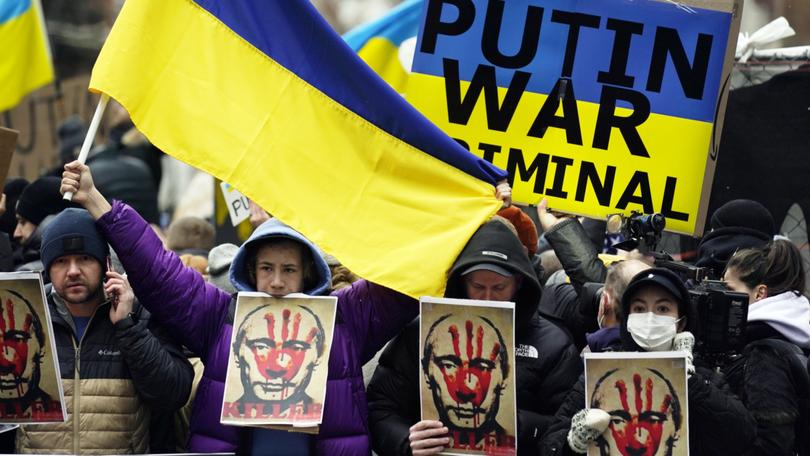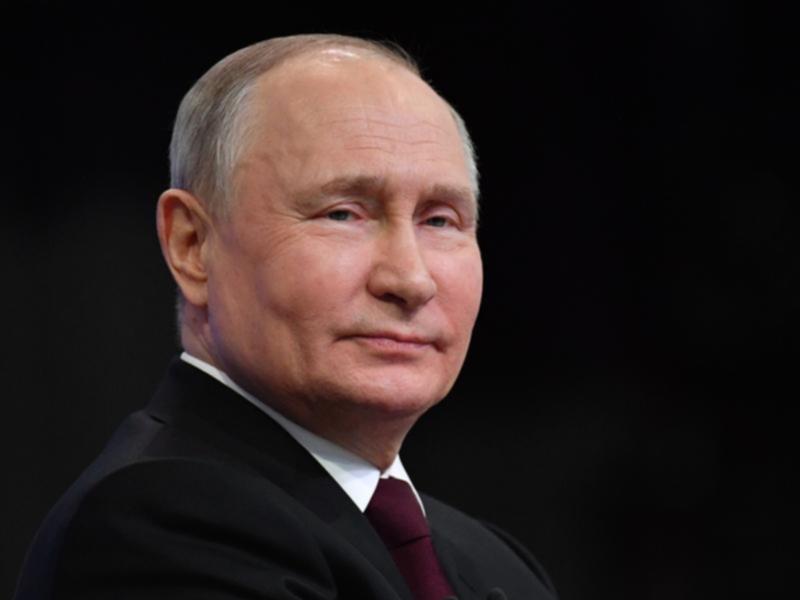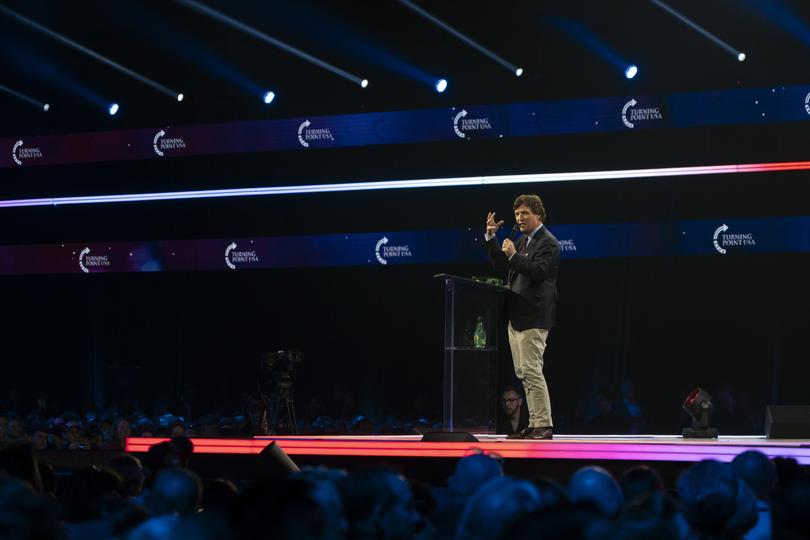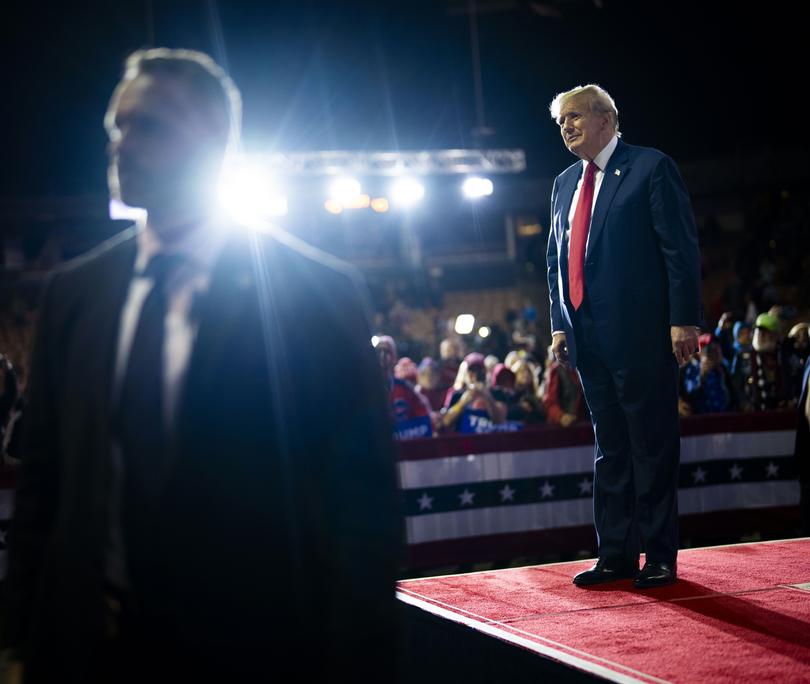The New York Times: Trump, Putin, Carlson and the shifting sands of today’s American politics
Instead of a ruthless autocrat seeking to conquer territory through the most violent war in Europe since the Nazis fell, Putin has made himself into something of an ally of certain right-wing forces in the US.

The idea was to isolate him, to make him a pariah, to put him in a box as punishment for brazen violations of international law. They kicked him out of their world leaders’ clubhouse, cut off his country’s economy, even issued an arrest warrant against him for war crimes.
But Vladimir Putin does not look all that isolated these days. Putin, the Russian president with czar envy who invaded neighboring Ukraine without provocation, killing or injuring hundreds of thousands, is having something of a moment in the United States.
With the help of a populist former Fox News star and America’s richest man, Putin is gaining a platform to justify his actions even as Russian and American journalists languish in his prisons. His favored candidate is poised to win the Republican presidential nomination while Congress weighs abandoning Ukraine to the tender mercies of Russian invaders.
Sign up to The Nightly's newsletters.
Get the first look at the digital newspaper, curated daily stories and breaking headlines delivered to your inbox.
By continuing you agree to our Terms and Privacy Policy.Putin’s filibuster-style appearance with Tucker Carlson on Elon Musk’s social media platform amid the security aid debate on Capitol Hill driven by Donald Trump offers a moment to reflect on the head-spinning transformation of U.S. politics in recent years. A Republican Party that once defined itself through muscular resistance to Russia has turned increasingly toward a form of neo-isolationism with, in some quarters, strains of sympathy for Moscow.

Instead of a ruthless autocrat seeking to conquer territory through the most violent war in Europe since the Nazis fell, Putin has made himself into something of a like-minded ally of certain right-wing forces in the United States, not least of all Trump, who praised his aggression as “genius” just before Russian forces stormed across the border into Ukraine in 2022. And Putin seems to be prevailing in Washington in a way that would have once been unthinkable, with the help of a party that still pays homage to Ronald Reagan.
“For Putin, it’s a manifestation of the American weakness,” said Yevgenia Albats, an independent Russian journalist who moved to the United States last year after threats of prosecution. To Putin, she said, the Carlson interview proves that “Americans realized that they lost the war with him” and were “sending him a close-to-the-next-president envoy to confirm his success.” It also serves a domestic purpose for Putin, she added. “It is a message to elites, who are arguing the cease-fire: You see, Americans blinked.”
U.S. politics did not need Putin to roil it. The rise of nativism, populism and polarization are homegrown phenomena with historical roots. After decades of a rough Cold War bipartisan consensus on America’s role in the world, globalization, mass immigration and foreign wars have discredited the old thinking for many and opened the door to figures like Trump, whose promise to put “America first” resonated in broad swaths of the country.
The change, nonetheless, has hardly been more startling than when it comes to Putin, whose government has spent years pumping disinformation into American social media. Casting himself as a defender of traditional civilization against moral decay in the West, a place of “outright Satanism” with “various supposed genders,” Putin has built something of a following in the United States.
More than 1 in 4 Americans, or 26%, has a favorable view of the Russian leader, according to a survey by YouGov, up from just 15% in early 2021 before the full-scale invasion of Ukraine a year later. Even if that number is an outlier compared with other surveys, it suggests there is a certain audience for the master of the Kremlin.

Carlson is among those who have grown more willing to listen and convey Russia’s message to Americans. As others have noted, Carlson used to refer to Putin as the “Russian dictator” who is “in league with our enemies,” but now he argues that Moscow has been misunderstood, or at least not heard. His commentaries assailing Ukraine have been gleefully repeated on Russian state media.
In a video explaining his decision to interview Putin, Carlson asserted that Americans and other English-speaking people were unaware of what was really happening regarding the war in Ukraine. “No one has told them the truth,” he said. “Their media outlets are corrupt. They lie to their readers and viewers.”
Never mind that even the Kremlin said Carlson was not telling the truth when he said that he was giving Putin a platform because “not a single Western journalist has bothered to interview” him. Plenty of Western news organizations have requested interviews since the 2022 invasion, as confirmed by Dmitry Peskov, Putin’s spokesperson, but the Kremlin chose Carlson because it saw him as more open than “the traditional Anglo-Saxon media.”
The Russian leader sees a path out of the penalty box.
The two-hour interview posted online Thursday night was not exactly gripping video. Putin rolled right over Carlson’s opening questions to deliver a nearly half-hour lecture on the history of Russia and Ukraine going back to the year 832, followed by his typical litany of grievances about the West. Carlson pressed Putin to release Evan Gershkovich, the Wall Street Journal reporter arrested in Russia a year ago on espionage charges that he and his employer have vehemently denied, but barely challenged the Russian leader and let him talk at length uninterrupted.
His decision to give Putin such a venue triggered a predictable wave of outrage. Former Secretary of State Hillary Clinton called Carlson a “useful idiot,” adopting Vladimir Lenin’s phrase for Western stooges, and former Rep. Adam Kinzinger, R-Ill., called him “a traitor.”
Clinton went on to suggest that the interview underscored a broader and disturbing phenomenon in the United States. “It’s a sign that there are people in this country right now who are like a fifth column for Vladimir Putin,” Clinton said on MSNBC this week.
Among those most frustrated by that are traditional Republicans like Sen. Mitch McConnell of Kentucky, the party’s leader in the Senate, who faces growing skepticism about Ukraine aid in his own conference.
While 11 Senate Republicans voted against aid to Ukraine in May 2022, shortly after the invasion, 31 voted not to advance aid Thursday, and it remains unclear whether House Republicans will permit a vote on the package.

Kinzinger, who broke with Trump and became one of his most vocal critics, recalled that Republicans used to assail President Barack Obama for not doing more to help Ukraine when Russia first seized Crimea in 2014. By contrast, Kinzinger wrote on social media Thursday, “Todays GOP would have attacked Obama in 2014 for doing too much for Ukraine.”
Waiting in the wings is Trump, determined to win back his old office. While Robert Mueller’s investigators in 2019 found no criminal conspiracy between Trump and Putin’s Russia during the 2016 campaign, the former president’s enigmatic affinity for the Russian ruler remains pronounced and, to many, still baffling.
Even in a recent campaign speech, Trump approvingly cited Putin’s opinion to argue that the Justice Department was unfairly prosecuting him, quoting the Russian saying that the legal case against the former president “shows the rottenness of the American political system.”
At other moments, Trump has refused to say whether he hopes Russia or Ukraine will win the war and has indicated that he would happily trade away Ukrainian territory to induce Russia to end the conflict.
Putin has taken note. As he gets his message out on social media, watches American lawmakers balk at arming the victims of his aggression and awaits the outcome of the presidential race, the Russian leader sees a path out of the penalty box.
This article originally appeared in The New York Times.
© 2024 The New York Times Company
Originally published on The New York Times
